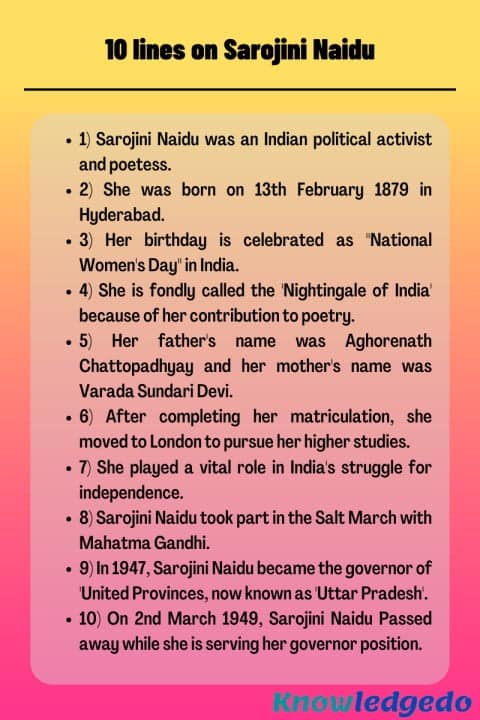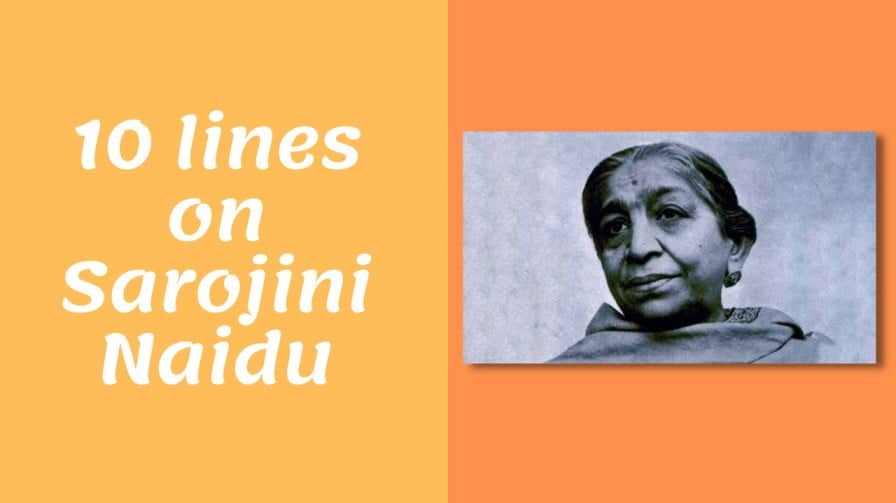10 lines on–Sarojini Naidu was an English-language Indian poet, freedom fighter and the first woman governor. People used to call him ‘Hindni Bulbul’ because of the sweetness of his voice. The Government of India issued a 15 paisa postage stamp in his memory on 13 February 1964.
10 lines on Sarojini Naidu in English
1) Sarojini Naidu was an Indian political activist and poetess.
2) She was born on 13th February 1879 in Hyderabad.
3) Her birthday is celebrated as “National Women’s Day” in India.
4) She is fondly called the ‘Nightingale of India’ because of her contribution to poetry.
5) Her father’s name was Aghorenath Chattopadhyay and her mother’s name was Varada Sundari Devi.
6) After completing her matriculation, she moved to London to pursue her higher studies.
7) She played a vital role in India’s struggle for independence.
8) Sarojini Naidu took part in the Salt March with Mahatma Gandhi.
9) In 1947, Sarojini Naidu became the governor of ‘United Provinces, now known as ‘Uttar Pradesh’.
10) On 2nd March 1949, Sarojini Naidu Passed away while she is serving her governor position.

5 lines on Sarojini Naidu
- Sarojini Naidu is a famous personality in India. She is known for being a well-known poet, social activist, freedom fighter and a good administrator.
- Aghorenath Chattopadhyay and Barada Sundari Devi Chattopadhyay were Sarojini Naidu’s parents in Hyderabad.
- Sarojini Naidu took a four-year break after completing her school education and went to London to pursue her further studies in 1895.
- When she was in London, Sarojini Naidu met her husband and soulmate, Paidipati Govindarajulu Naidu. He was a physician by profession.
- “The Golden Threshold” the first collection of poems by Sarojini Naidu was published in 1905. Gopal Krishna Gokhale greatly admired this collection of poetry.
short essay on Sarojini Naidu
Sarojini Naidu was an English -language Indian poet, freedom fighter and the first woman governor. People used to call him ‘Hindni Bulbul’ due to his sweet voice. The Government of India issued a 15 paisa postage stamp in his memory on 13 February 1964.
Childhood
Sarojini Naidu was born on 13 February 1879 in a Brahmin family in Hyderabad. His father’s name was Aghorinath Chattopadhyay, she was a scholar, scientist, philosopher, social reformer and educationist. Sarojini’s mother’s name was Vardasundaridevi, she was a poetess. She was brought up without caste discrimination. He was brought up as an Indian rather than a Hindu or Brahmin.
Education
Sarojini Naidu passed the matriculation examination at the age of 12 and passed first in Madras. Then in 1895, he went to England where he studied at King’s College in London and Girton College in Cambridge. During this time he came in contact with famous writers Edmund Gosse and Arthur Symons.
Sarojini was introduced to Govinda Rajulu Naidu at the age of 14. Naidu belonged to the so-called Shudra caste of Andhra Pradesh. In 1898, Sarojini had a ‘civil marriage’ with Naidu. They had four children: Jayasurya, Padmaja, Randhir and Lilamani. Out of them, Padmaja became the Governor of West Bengal.
Political life
Sarojini Naidu became active in politics in 1917 AD and completed poetry. Gopal Krishna Gokhale was impressed by his speech at the Indian National Congress Convention in 1906 and urged him to serve the Motherland. He led several movements for the advancement of women. Is. In the convention for widow remarriage held in Madras in 1908, he worked tirelessly to awaken women. He was awarded the “Kaiser Hind” gold coin in Hyderabad in recognition of his services during the plague epidemic. Which he returned against the tyranny of power. He always worked for Hindu-Muslim unity. [1]
Is. From 1915 to 1918, he used to give lectures on welfare, the dignity of labour, the liberation of women’s problems and nationalism in various villages and cities in India. He strongly opposed the Motegunchamsford Reforms and the Rowlatt Act. He gave strong speeches against the Jalliawala Bagh massacre in 1919 and martial law in Amritsar. and distributed literature. Is. In 1925, he was elected as the President of the Indian National Congress.
In Hyderabad in 1908, Sarojini organized relief operations when the Moosi river was flooded. For that, the British government honoured him with the title of ‘Kaiser-e-Hind’ and a gold medal. Aggrieved by the British government’s unfair and harsh treatment of Indians, he returned the title and gold coin to the government in 1920.
Literary life
His first collection of poetry was Heerani Umber in E.S. He came out in 1905. Then in 1914, he met Gandhiji and there was a change in his life he immersed himself in the struggle of women’s service, social service and satyagraha. He was at the forefront of Lathimar in Gharasana, and participated in the Quit Hind Chodo movement of 1942 and served 21 months in jail. Thus, his service to the country from 1920 to 1949 as a unique disciple of Gandhiji is unforgettable.
Sarojini Naidu wrote a poem of 1300 lines and a play of 2000 lines under the title The Lady of Lake. He published the collections of poems The Golden Threshold in 1905 and The Bird of Time in 1912 and The Broken Wing in 1917.
FAQ on 10 lines on Sarojini Naidu
Answer: Naidu’s literary work as a poet earned her the sobriquet the “Nightingale of India”, or “Bharat Kokila” by Mahatma Gandhi because of the colour, imagery and lyrical quality of her poetry. Born in a Bengali family in Hyderabad, Chattopadhyay was educated in Madras, London and Cambridge.
Sarojini Naidu, née Sarojini Chattopadhyay, (born February 13, 1879, Hyderabad, India—died March 2, 1949, Lucknow), political activist, feminist, poet, and the first Indian woman to be president of the Indian National Congress and to be appointed an Indian state governor.
Answer: Sarojini Naidu
